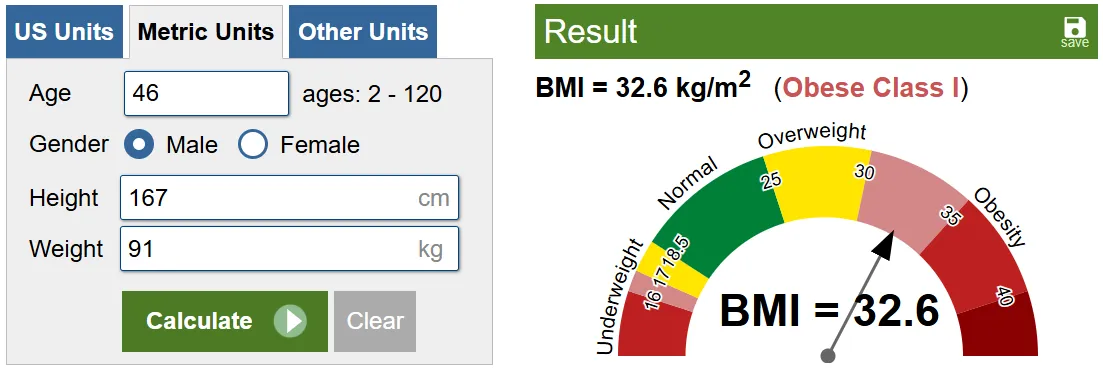I was just reading an article from Finland that 1 in 4 Finns are significantly obese, with a BMI over 30. Now, BMI is not a very good measure for individuals, but it is a good enough measure for large populations. The reason it isn't good for an individual is that it is just a weight versus height calculation, and doesn't take into consideration body composition. But for a large, diverse population, assumptions can be made about the average level of body composition.

For example as an individual, this is my BMI.
I am pretty short at 167 cm (5'6") and my weight is high at 91 kilos (200 lb), but I am also pretty broad in the shoulder and have a significant amount of muscle on my frame. For me to touch on the upper-end of "normal" BMI at 25, I would need to lose 21 kilos, or almost a quarter of my bodyweight. The last time I weighed 70 kilos, was about twenty years ago.
However on average, compare me to my other men in my height range, and I am in pretty good (visual) condition. I am not that overweight by sight, just by BMI. Collect a thousand people together and work out their average "normal", and the BMI becomes more predictive. A million people and it is good enough to make broad generalisations about the population, and perhaps give some direction.
Yet, because of the limitations of the BMI calculation, people often largely dismiss it without considering the broader implications. This happens in many of the generalised statements, which seems to come down to people trying to protect their ego. For example, I can explain away the irrelevance of the BMI indicator for me personally, but what I should be doing is recognising that on average weight is increasing for a number of factors that could be affecting me also - like changes in activity, diet and other influences. I should also take a look in the mirror and take stock of how I physically feel and question if this is where I want to be.
It is not.
The problem with the "protection" of the self approach, is that it is influencing emotional feelings, without checking for alignment with physical feelings. A person can create a type of fantasy around themselves, whilst feeling physically terrible. And rather than doing something that affects their health for real, they create a stronger fantasy.
I am happy the way I am.
Fine. Then stop complaining about all of the physical ailments you feel. Stop complaining about the sore legs and joints, the tight neck and being out of breath. Smile when you are out of breath when climbing stairs and stop negatively judging people who you perceive as being in better condition than yourself, whilst looking on with an obvious look of envy. If you are truly happy with the way you are, no matter who judges or how you are judged, you will accept it. And, if you are truly happy with the way you are, you needn't compare yourself to anyone else at all.
Also, if you are truly happy with yourself, you have to accept what comes with that set of conditions. You have to accept that you can do some things, but not other things. You have to accept that you might be left out of some activities and that not all activities are suitable for all people. A very tall person has to duck under some doorframes and has to accept that child's playground equipment isn't made for them to enjoy. It is possible to accept one's current condition, not like it, and then go about changing it in a better direction.
Acceptance doesn't mean settling.
There has been a cultural shift in the last few decades where people who look to improve themselves are actually judged negatively in some areas. Weight is one of these areas. This has got to the point where someone overweight and confident is seen as positive, but if that same person loses weight, they are treated like some kind of traitor to the cause.
What is the cause that people are defending? Unhealthiness?
And yeah, it is possible to be overweight and pretty healthy, but again - look at the averages and statistics and acknowledge that any individual is far more likely to be in the unhealthy range, than as an outlier in the healthy range. It is just the way it works.
Accept it.
One of the interesting things from the article linked was that it compared different regions of Finland, with Ostrobothnia having the highest BMI numbers at just over 30, and the Helsinki region the lowest at around 17. The reason given by the article?
More physical activity in urban areas
According to THL’s Päivi Mäki, regional differences in obesity rates can partly be explained by the easier access to physical activity in larger cities.
Cities offer better opportunities for walking, cycling, and using public transport instead of driving door-to-door. There are also more organised sports and exercise activities available.
"At the same time, we know that lifestyle habits are linked to education levels, which also vary between regions," Mäki added.
Partly.
What isn't mentioned here is that education levels in Finland are high *all across Finnish populations, at least from a schooling perspective. Cultural variations between city and regional areas differ, especially when it comes to "social judgement" where cities tend to be more "visually influenced" and people want to fit into social norms. Helsinki people also dress "better" than other areas, even other Finnish cities.
But what isn't mentioned is that the Helsinki region is 19% foreign background, meaning that they are born, or have one parent born outside of Finland. This affects some of the education levels too, likely downward, but also the body composition of people. The percentage of foreign background residents in Ostrobothnia is around 3.7% - quite a difference. Does that influence the BMI numbers?
Probably.
But the biggest influencer of BMI isn't background, activity, or diet. Like it or not, the biggest influencer on our individual outcomes is us. No matter how we feel about the world, or the various past conditions and current hurdles, it is me as an individual who decides what my next course of action is. Yes, I have predispositions and habits that I didn't actively choose, but I also have the ability to start affecting my behaviours and beliefs as I go forward. I can choose to be happy with myself as is and maintain it, or I can be happy with myself right now and look to improve my condition for tomorrow.
The interesting thing to recognise is that just like how many people cite the "looks fade" statement as a reason not to bother, they don't recognise that all things change. And even if happy with current conditions, those conditions will change. I look at older people like my in-laws who were relatively active but are very degraded as they near their eighties, and I see people in their forties in worse condition.
Does that feel good?
As someone who has been heavily negatively affected throughout my life at a physical and mental level, I can say that the degradation is not a pleasant experience at all. Anyone who actively stays passive and let's "nature take its course" probably hasn't the clarity of just how bad it feels to have that happen. And nature takes the course that the conditions allow. The better the conditions, the slower the negative degradations, and the better the quality of life in pretty much all aspects of experience.
And yes. It is possible to be in very poor physical condition and have a high quality of life. But that possibility is going to be reduced by the conditions. So why set up extra hurdles and challenges to experience? Why make the future more difficult than it needs to be?
A lot of people, especially as they are middle-aged and beyond, start thinking about their quality of life in the future. Many want to be active, and imagine themselves travelling the world, or playing with their grandchildren. But, to have those future conditions requires the work to be done now. And when I say "work", I mean the habits required to improve conditions where possible, to slow down the inevitable degradation. People work hard to have a good retirement, only to ignore many of the fundamental factors that give them the greatest chances to enjoy it.
It saddens me that people are reducing their future potential at alarming rates, at younger and younger ages, by just not doing the simplest things to look after themselves. All the excuses in the world might make us feel better, but they don't make us better.
What is life when all that we want is covered by excuses as to why we don't have it?
Taraz
[ Gen1: Hive ]
Be part of the Hive discussion.
- Comment on the topics of the article, and add your perspectives and experiences.
- Read and discuss with others who comment and build your personal network
- Engage well with me and others and put in effort
And you may be rewarded.
